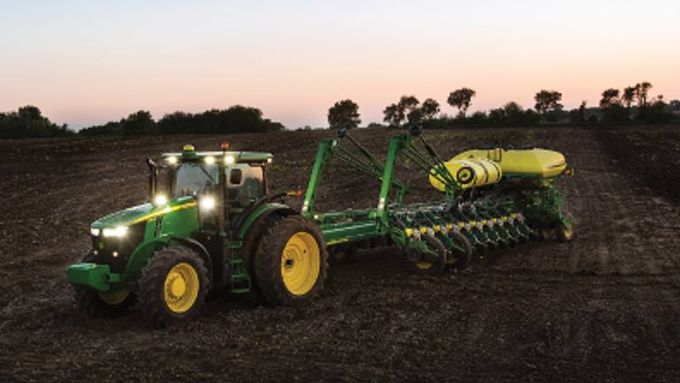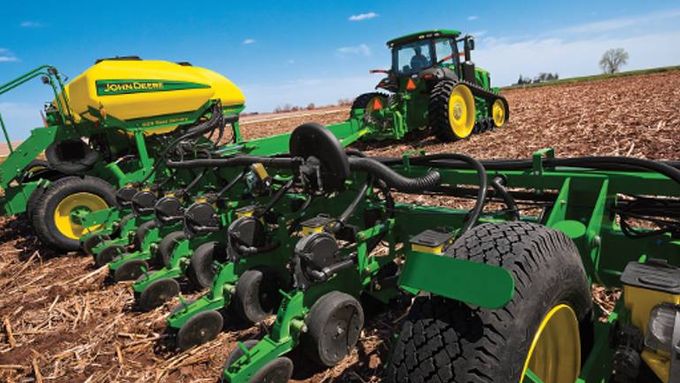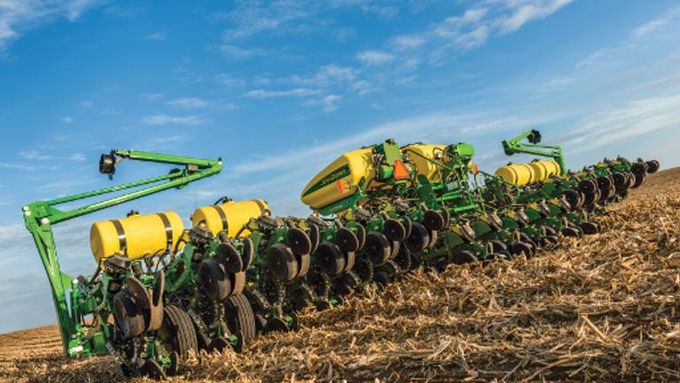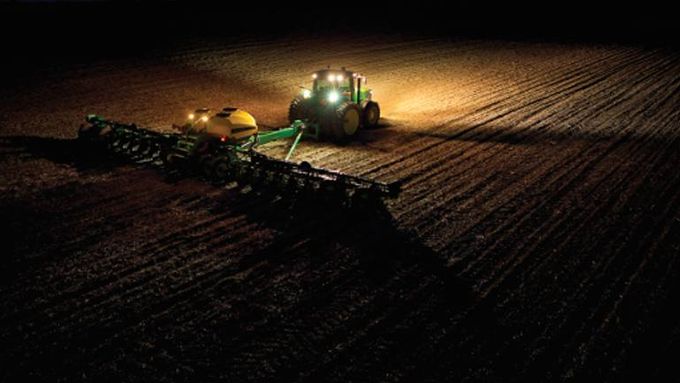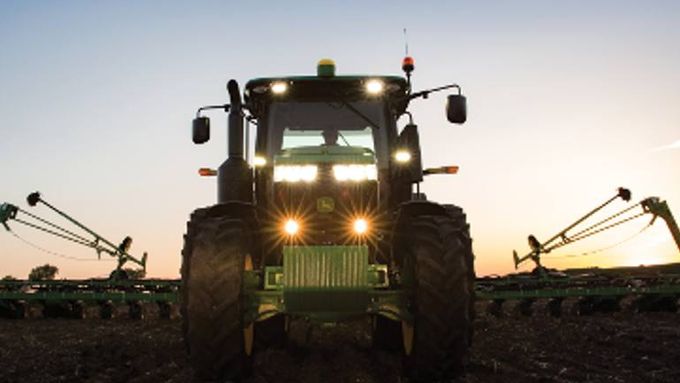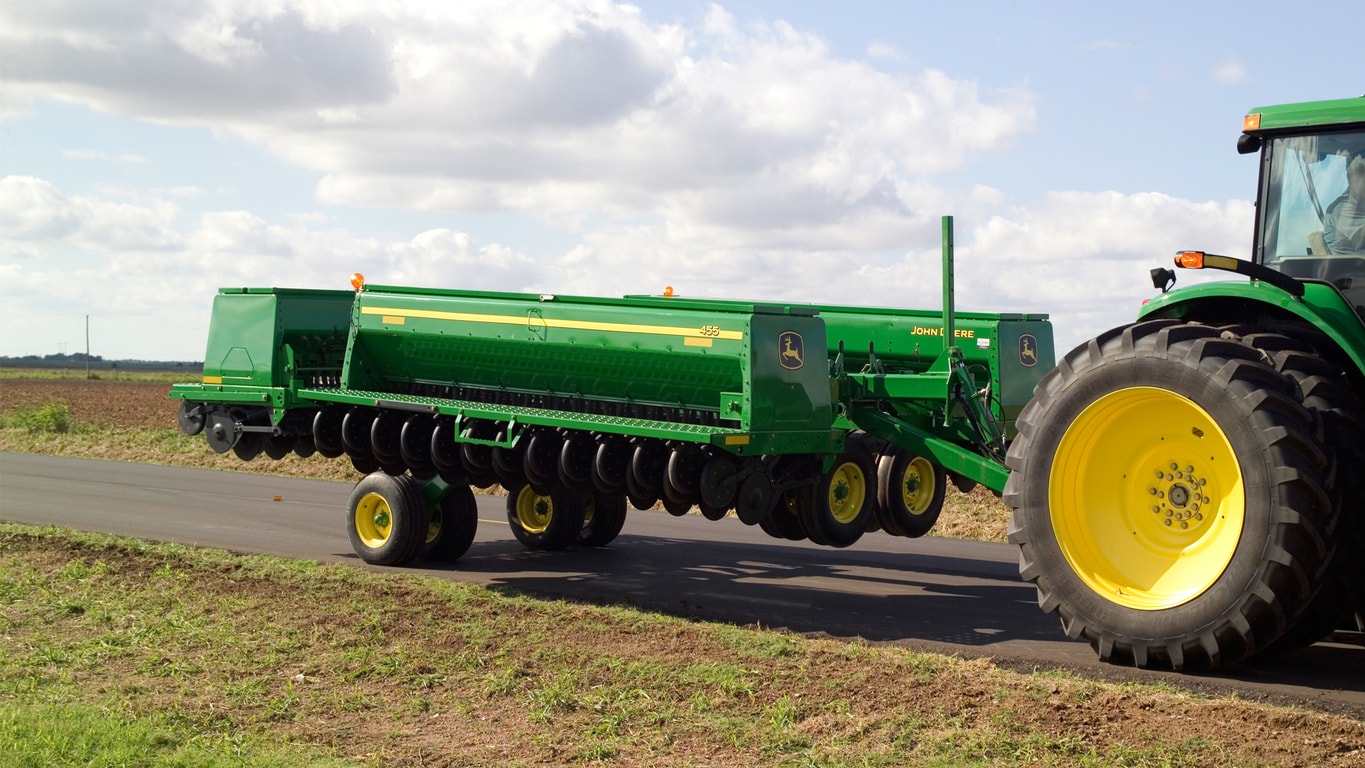1590
- Productive Seedbox capacities
- Easy-to-read seed level indicator
- Accurate fertilizer metering
- Box drill acremeter
Price may vary based on location and options.
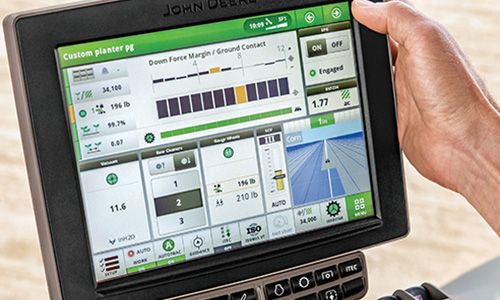
SeedStar 4HP monitoring system
SeedStar 4HP monitoring system lets you view multiple functions at once in a very simplified overview layout. Just touch the bar chart and zoom into any row for detailed information regarding that row. Highly configurable run pages that let you arrange SeedStar modules by operator preference. Complete simplified setup from work setup page instead of having multiple applications to open.
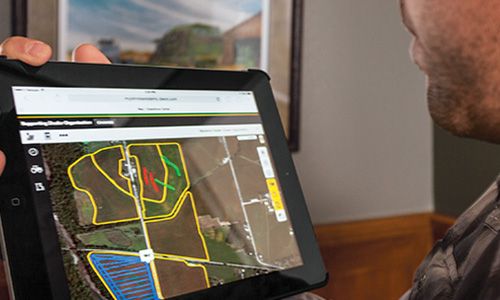
John Deere Operations Center
What do you do with all your data once you've collected it? Put it to work for you with John Deere Operations Center, where you have the ability to turn you valuable information into a plan of action. Collect data easily, review to make accurate decisions and share with your trusted advisors. Within this online portal, you can see average yield, total yield, average moisture seeding variety and rates and more. Every time you're done seeding a field, that information is waiting for you in the Operations Center to make adjustments improvements for the next year.
features
 Electronic population rate control
Electronic population rate control

With seed prices on the rise, producers want the ability to monitor and control seed populations on the go.
Electronic population rate control (EPRC), in base equipment on the 1590 Drill, allows producers to adjust the population rate right from the convenience of their tractor cab.
The system:
- Features an in-cab rocker switch to adjust the electric motor that controls the population rate
- Is manually adjusted – the operator must hold down the adjustment switch until the desired rate is met
- Can be overridden by pushing back on the motor to allow the producer to make a manual adjustment to the rate if needed
NOTE: To give producers the ability to monitor the population rate on the go, it is highly recommended they equip the unit with a ComputerTrak™ monitor or SeedStar™ population monitoring.
NOTE: One system is used with 3.05-m (10-ft) and 4.6-m (15-ft) drills. The 6.1-m (20-ft) models require two systems.
 Seedbox
Seedbox
Seedboxes have large capacity for longer intervals between stops for refilling.
Plain grain or combination grain/fertilizer seedboxes are available to match the producer's needs and crops.
The versatile grain/fertilizer box with 19-mm (7.5-in.) row spacing can be set for 100 percent grain or 60 percent grain/40 percent fertilizer.
The bulkheads in the seedbox reduce material shifting in the box for increased seeding efficiency.
The sight glass located near the end of the box on combination grain fertilizer drills allows the operator to view seed level at a glance.
Seedbox capacities |
|||
| Plain grain | Combination grain/fertilizer |
||
100 percent grain |
60 percent grain/40 percent fertilizer |
||
| Grain, bu/ft (L/m) | 3.5 (405) |
3.5 (405) |
2.1 (243) |
| Fertilizer, bu/ft (L/m) | --- |
--- |
1.4 (162) |
| Total, bu/ft (L/m) | 3.5 (405) |
3.5 (405) |
3.5 (405) |
| Plain grain box | Combination box | |
| Total box - 3.05 m (10 ft) | 1233.4 L (35 bu) | 1317.9 L (37.4 bu) |
| Total box - 4.6 m (15 ft) | 1850.1 L (52.5 bu) | 2026.2 L (57.5 bu) |
| Total box - 6.1 m (20 ft) | 2466.7 L (70 bu) | 2635.9 L (74.8 bu) |
Capacities with grass seed attachment
| 3.05 m (10 ft) | 4.6 m (15 ft) | 6.1 m (20 ft) | |
| Grass seed box with plain grain box | 105.7 L (3 bu) | 169.1 L (4.8) | 211.4 L (6 bu) |
| Grass seed box with combination box | 52.9 L (1.5 bu) | 84.6 L (2.4 bu) | 105.7 L (3 bu) |
 Seed tube
Seed tube
A long, internally smooth seed tube with a molded elbow is supported at the seed tube support. From there, it is connected to a short convoluted seed tube, allowing product to flow smoothly to the openers and still flex.
The tube flexes to avoid crimping for consistent seed flow. It is made of non-corrosive nylon material for long life. Long tubes are 55.4 cm (21.8 in.) and short tubes are 10.8 cm (4.25 in.).
Elbow at meters to angle the seed tube directly to the openers.
The smooth inside diameter provides smooth seed flow from the meters to the furrow openers.
 Seed tube with Y-adapter
Seed tube with Y-adapter
The combination grain/fertilizer drill with 19-cm (7.5-in.) row spacing features a convoluted tube directing fertilizer from the discharge hole to the top of the steel seed tube at the seed boot. From there, a special Y-adapter lets seed and fertilizer mix before going into the furrow.
 Seed placement with ProSeries™ Opener
Seed placement with ProSeries™ Opener
 1590 Series down pressure
1590 Series down pressure
ProSeries single-disk no-till openers are included in base equipment. The single-disk openers are mounted on one rank on the 38.1-cm (15-in.) row spacing single rank units and on two ranks on the 19-cm (7.5-in.) and 25.4-cm (10-in.) row-spacing units. The single-disk openers provide consistent and accurate seed placement.
The single-disk openers are gang mounted and are hydraulically raised and lowered. The hydraulics also work to provide a wide range of downforce settings for the openers.
The active hydraulics work in conjunction with the opener spring to provide an adjustable range of 74.8 kg to 181.4 kg (165 lb to 400 lb) of down pressure per opener to penetrate hard soils and heavy residue.
The down pressure is easily adjusted with the pressure valve located on the front of the mainframe, giving the operator the ability to quickly adjust, or dial in, the down pressure as operating conditions change.
For additional ballast in hard-to-penetrate conditions, tractor suitcase weights may also be added to obtain maximum down pressure per opener. On the 3.05-m (10-ft) and 4.6-m (15-ft) machines, up to 10 weights can be added. On 6.1-m (20-ft) machines, up to 20 weights can be added (10 per side).
The no-till openers work not only in no-till conditions, but also in clean-till conditions. There are 5.1 cm (2 in.) of free travel in the opener before spring down pressure takes over, allowing the opener to move over individual rocks and minimizing the chance of the gauge wheels bulldozing soil in soft or mellow conditions.
Secondly, the opener spring will then travel a maximum of 20.3 cm (8 in.) up or 15.2 cm (6 in.) down before the hydraulics react to uneven seedbeds.
Lastly, the cylinders will allow the openers to travel up or down an additional 40.6 cm (16 in.) with active hydraulic down pressure to follow the ground. The hydraulics will give the openers additional pressure when needed or allow the openers to go into relief if the pressure becomes too high.
Narrow seed boot
 Right-side view of seed boot
Right-side view of seed boot
 Left-side view of seed boot
Left-side view of seed boot
On the ProSeries Opener, the seed boots are made of the same material as the older high-wear boots previously offered, which is a highly abrasion-resistant white iron. However, this seed boot is narrower, causing less soil throw on neighboring rows. It also sits up tight to the disk blade, resulting in less wear on the boot.
 Seed boot
Seed boot
Below are two diagrams showing the seed boot comparison from the 90 Series Opener (highlighted in green) to the ProSeries Opener (highlighted in red). In these diagrams, the ProSeries seed boot is narrower and sits up tighter against the disk blade.
Seed boot comparisons
- ProSeries seed boot highlighted in red
- 90 Series seed boot highlighted in green

- A is the boot comparison at a 44.5-mm (1.75-in.) depth
- B is the boot comparison at a 63.5-mm (2.50-in.) depth
- C is the ground plane
 Two inside views of seed boots (90 Series in yellow and ProSeries in green)
Two inside views of seed boots (90 Series in yellow and ProSeries in green)
The inlet/entrance diameter is 33 mm (1.3 in.) on the 90 Series and the ProSeries. The seed tube internal diameter is 27.4 mm (1.08 in.). The cross section is larger than the inlet for the 90 Series and ProSeries.
Serrated closing wheel
 Serrated closing wheel
Serrated closing wheel
Serrated closing wheel:
- The serrated closing wheel offers an improved closing system when seeding into hard soils or high residue conditions. The notches help break up the top layer of soil covering the seed trench. The notches also reach through residue to seal off the trench better, rather than simply moving residue over the trench. Consistent soil over the seed bed provides optimal germination and emergence. The serrated closing wheel has performed well in all conditions but truly shines in high residue or hard soil conditions.
Smooth closing wheel:
- The smooth closing wheel is still offered for producers who seed into loose soil conditions with little residue. The smooth closing wheel has performed well over the years and has a long-lasting service life, keeping replacement costs down.
Narrow and flexible press wheel
 90 Series press wheel
90 Series press wheel
 ProSeries press wheel
ProSeries press wheel
The narrow and flexible press wheel has improved overall seed-to-soil contact. The improvement is in the shape and diameter of the press wheel. The ProSeries Opener press wheel profiles the trench better, partly due to the narrower and more flexible wheel itself, measuring 1.8 cm x 25.4 cm (0.71 in. x 10 in.). The 90 Series press wheel is 1.9 cm x 22.9 cm (0.75 in. x 9 in.).
 Front view (left) and side view (right) of press wheel
Front view (left) and side view (right) of press wheel
Growers that have consistent seed depth have a greater opportunity for uniform emergence, uniform tillering, uniform flowering, and uniform maturity. This leads to increased yield potential, easier management of crop, and typically lower harvest loss on canola.
Improved seed tab
 ProSeries Opener seed tab
ProSeries Opener seed tab
 90 Series Opener seed tab
90 Series Opener seed tab
The ProSeries Opener has an upgraded seed tab that compliments the furrow much better. This seed tab, with an angled edge that profiles the trench better, also allows for consistent seed placement due to the flexible material that was designed to make it less brittle. This also minimizes seed bouncing, which increases overall seeding accuracy.
Spoked gauge wheels
 Spoked gauge wheel
Spoked gauge wheel
 Spoked gauge wheel
Spoked gauge wheel
Growers have historically had to make some difficult planting and seeding decisions due to weather. Operators have been forced to plant in wet conditions that are far from optimal in order to plant within the optimum planting window. Those operators have experienced poor performance from wet soils working in between the depth gauge wheel and the opener disk and not having a way out. This creates the possibility of the depth gauge wheel or opener disk to seize up and drag through the soil.
The spoked gauge wheel is a solution for operators who plant in these conditions to allow the mud and debris that get caught behind the depth gauge wheel to easily flow through the wheel and continue providing superior depth performance.
The spoked gauge wheel is designed for optimum performance. Its features include serviceable, stamped inner and outer rims. The wheel also has cast spokes and bearing hubs for increased strength. This allows for smaller spokes, creating larger open surface area for mud and debris to flow more easily than competitor’s wheels. Another improvement over the closed gauge wheel is a snap-ring bearing retention. Simply remove the snap ring, replace the bearing, and place the snap ring back.
 Gauge wheel snap ring
Gauge wheel snap ring
 Replacing the bearing on the gauge wheel
Replacing the bearing on the gauge wheel
Heavy trash fields from no-till environments have also tested very well with the spoked gauge wheel. Some growers provided feedback of crop residue getting inside and jamming up the gauge wheel and opener. This spoked gauge wheel has shown exceptional performance within these areas as well. These wheels are compatible with both 90 Series openers on seeding tools and planter row-units.
Below is a chart that demonstrates a competitive advantage over MudSmith™ wheels for mud and residue flow:
| MudSmith | John Deere | Percent improvement | |
| Open area | 329 cm2 (51 cu in.) | 471 cm2 (73 cu in.) | 43 percent |
| Rim height | 1.9 cm (3/4 in.) | 1.4 cm (9/16 in.) | 25 percent |
| Spoke width | 3.5 cm (1-3/8 in.) | 1.9 cm (3/4 in.) | 45 percent |
The wheel is serviceable along with other parts.
- AA86055 – complete wheel assembly
- A101570 – inner wheel rim half
- A101571 – outer wheel rim half
Not compatible in dual gauge wheel applications.
MudSmith is a trademark of MudSmith, LLC.
Narrow gauge wheels leave more stubble standing
 Optional 76.2-mm (3-in.) narrow gauge wheels
Optional 76.2-mm (3-in.) narrow gauge wheels
The 76.2-mm x 406.4-mm (3-in. x 16-in.) depth gauging wheel:
- Compatible with all 90 Series and ProSeries Openers
- Provides more clearance between openers for residue flow
- Leaves more stubble standing and disturbs less residue than the 114.3-mm x 406.4-mm (4.5-in. x 16-in.) gauge wheel
Why cover crops?
With proper management and the right selection of cover crops, you can slow soil erosion, improve soil health, enhance water availability, suppress weeds, control pests and diseases, increase biodiversity, and reap numerous other benefits for your farm’s health and profitability. Cover crops act as a protective shield for the soil, reducing the impact of heavy rains and wind, which in turn minimizes topsoil loss. They improve soil structure by adding organic matter and fostering beneficial soil microorganisms, which enhances nutrient cycling and retention.
Additionally, cover crops can break up compacted soil layers, improving root penetration and water infiltration. By suppressing weeds, they reduce the need for chemical herbicides, leading to more sustainable farming practices. Cover crops also provide beneficial habitat for insects and pollinators, boosting on-farm biodiversity. Furthermore, they can help in sequestering carbon, contributing to climate change mitigation. Overall, integrating cover crops into your farming system can lead to more resilient and productive agricultural landscapes, ultimately enhancing long-term profitability.
What tool works best for you?
 N500C No-Till Air Drill
N500C No-Till Air Drill
The N500C model machines provide extensive crop compatibility, making them an excellent choice for customers looking to seed multiple crops and crop blends using a single tool. These machines can be customized with two unique rollers in multiple sizes to meet the specific needs of each operation. Refer to the crop compatibility link by roller below. Additionally, the N500C is capable of seeding in various soil conditions and residue types. Featuring the Pro-Series No-Till opener, it is designed to handle a wide range of conditions, from heavy residue to lightly worked soils. For more information, see the Sales Manual links below.
N500C crop compatibility
N500C model
 1590 No-Till Box Drills
1590 No-Till Box Drills
Box Drills are an excellent choice for seeding cover crops, offering simplicity and high placement accuracy. Equipped with the Pro-Series No-Till opener, the 1590 Box Drill can handle a variety of conditions, from heavy residue to lightly worked soils. The 455 and BD11 Series Box Drills, featuring a double disk opener, are ideal for tilled seed beds. They also provide wider widths and a range of spacing options. For more information, see the Sales Manual link below.
Box Drills
Already have an Air Seeder?
 C-Series Air Cart tendering
C-Series Air Cart tendering
Any John Deere air cart compatible tools are excellent options for seeding cover crops. Air carts come with multiple tanks, enabling you to combine or blend your cover crop mixes effectively. With a wide range of meter roller options, air carts can be easily tailored to meet your specific cover crop needs and paired with the most suitable tool for the job. For more information, see the Sales Manual links below.
Air Seeding
Air cart roller information
specs
| Working width | 4.57 m 15 ft |
| Total weight empty | 3837.4 kg 8460 lb |
| Capacities | Plain grain 1850.1 L 52.5 bu Grain/Fertilizer 2026.2 L 57.5 bu |
| Opener assembly | Spacing 19.1/38.1/50.8 cm 7.5/15/20 in. |
| Working width | 4.57 m 15 ft |
| Transport width | 4.65 m 15.25 ft, in. |
| Transport height | 2.08 m 6.83 ft, in. |
| Overall length | With wheels - 6.1 m 20 ft |
| Total weight empty | 3837.4 kg 8460 lb |
| Hitch weight empty | 1406.1 kg 3100 lb |
| Hitch weight full | 2041.2 kg 4500 lb |
| Clearance | Road opener - 20.3 cm 8 in. |
| Plain grain | 1850.1 L 52.5 bu |
| Grain/Fertilizer | 2026.2 L 57.5 bu |
| Type | Fluted-feed |
| Number of openers | 18 or 24 |
| Spacing | 19.1/38.1/50.8 cm 7.5/15/20 in. |
| Down pressure | Active hydraulic down pressure per opener - 75 to 204 kg 165 to 450 lb |
| Disk | At a 7-degree angle - 45.7 cm 18 in. |
| Gauge wheels | 11.4 x 40.6 cm 4.5 x 16 in. |
| Press wheels | 2.54 x 25.4 cm 1 x 10 in. |
| Closing wheels | 2.54 x 30.5 cm 1 x 12 in. |
| Hydraulic requirements | One selective control valve (SCV) |
| Electrical requirements | Seven-pin connection |
Similar Products
Prices and availability may vary by dealer. Taxes not included. Images for illustration purposes only. Financing subject to approved credit by John Deere Financial. Down payment may be required to receive financing. Restrictions may apply outside of Hutson’s area of responsibility. See dealer for details.


